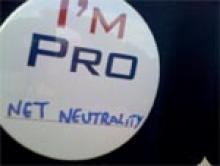Image


The real tragedy of today’s ruling is that this entire issue is a self-inflicted wound by the FCC. When it decided not to regulate broadband Internet under Title II (by placing cable broadband into Title I and moving DSL broadband from Title II to Title I), it turned its back on a specific delegation of powers from Congress. There would be no debate about ancillary authority if the FCC were to recognize that broadband Internet is a Title II “telecommunications” service. The FCC has the statutory power it needs if it chooses to use it.Photo used under Creative Commons license from AdamWillis.
